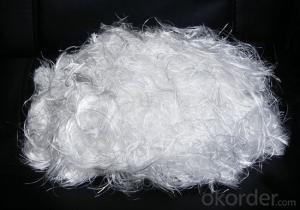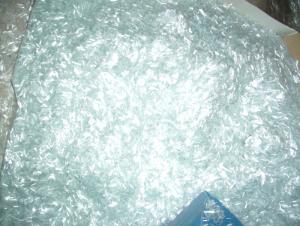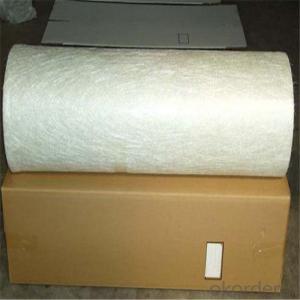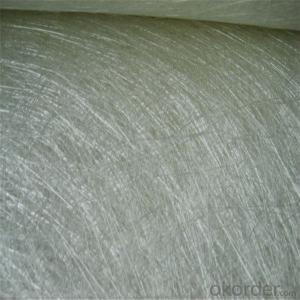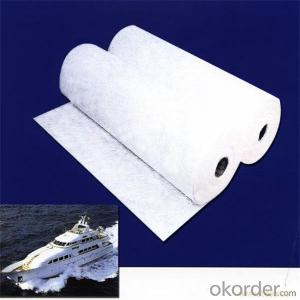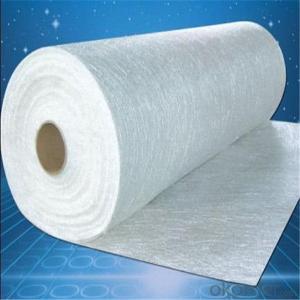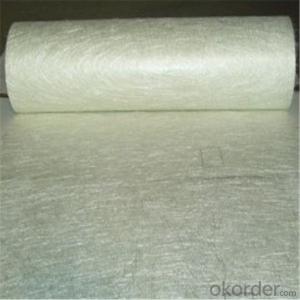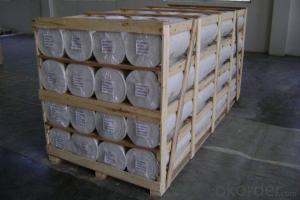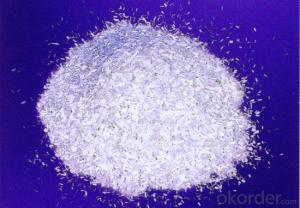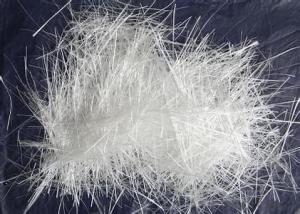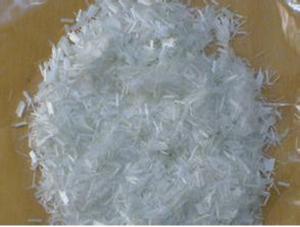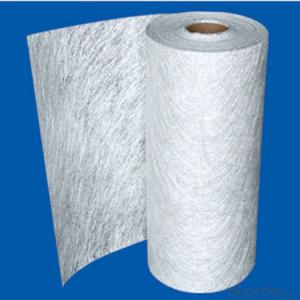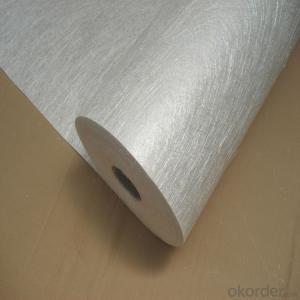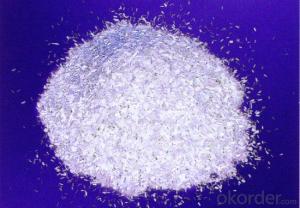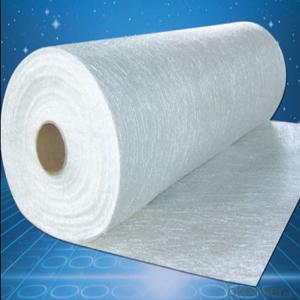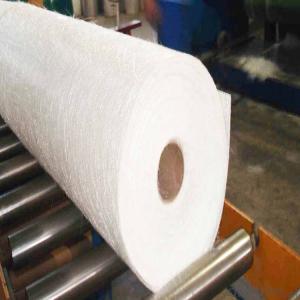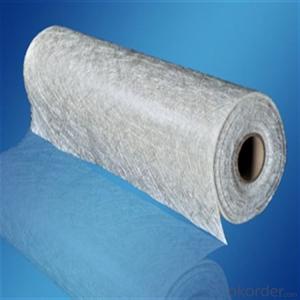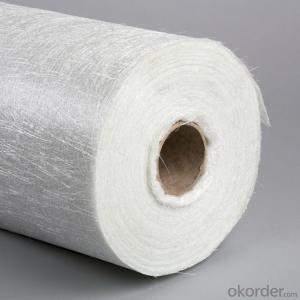High Silica Chopped Strands
- Loading Port:
- China Main Port
- Payment Terms:
- TT or LC
- Min Order Qty:
- 4000 kg
- Supply Capability:
- 5000000 kg/month
OKorder Service Pledge
OKorder Financial Service
You Might Also Like
Product Description
Silica fiberglass is inorganic fiber that contents more than 96% of SiO2, it's resistant to high temperature, soft point 1700°C, long term service temperature 900 °C, it can work 10 minites at 1450 °C and keeps good state at 1600 °C for 15 seconds. For it's properties of chemical stability, high temperature resistance and ablation resistance, it widely used in aviationand aerospace, metallurgy, chemical, building material and fire fighting industry, etc.
Our factory is the only one that specialized manufacture silica fiberglass in China and has the production line of the whole process from marble making, fiber forming, weaving, and finish. The strength of silica fiberglass made from Na2O-B2O3-SiO2 system glass is 3-5 times higher than that from E glass. The products sold to more than 20 provinces, cities, autonomous regions and exported to foreign countries.
Silica fiberglass products are available in forms of needled mat, fabric, scrim, staple yarn, chopped strand and cord, etc.
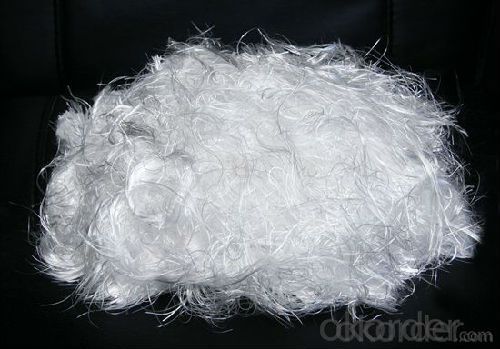
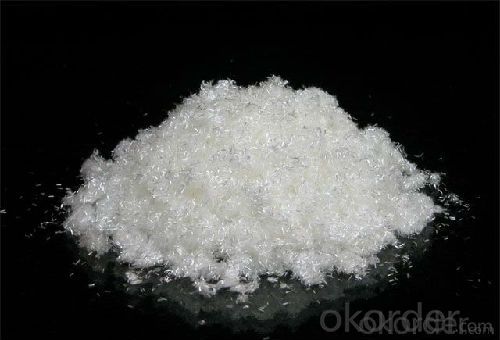
Specification
| Product Code | SCD-06 | SCF-60 | SCD-06-S | SCF-60-S |
| Length(mm) | 6 | 60-100 | 6 | 60-100 |
| Diameter | 6um/9um | 6um/9um | 6um/9um | 6um/9um |
| L.O.I.% | 7-12 | 7-12 | ≤5 | ≤5 |
Product Application
· High temperature resistant, insulation and sealing material
· High temperature ablation resistant material
· Fireproof material (for fireproof protective clothe, fireproof curtain, fire blanket)
· Dust collecting in media of high temperature gas and filtration in media of high temperature liquid
· Filter for molten metal
· Distinguisher, insulation material, filtration of automobile and motorcycle
· Protective material for welding
· Electricity insulation material
Package and delivery time
Package:High silica chopped strand is packed with bags and pallets,totally 20 pallets one 20GP.
Delivery time:The products will be ready in 7-15 days after the confirmation of the order.
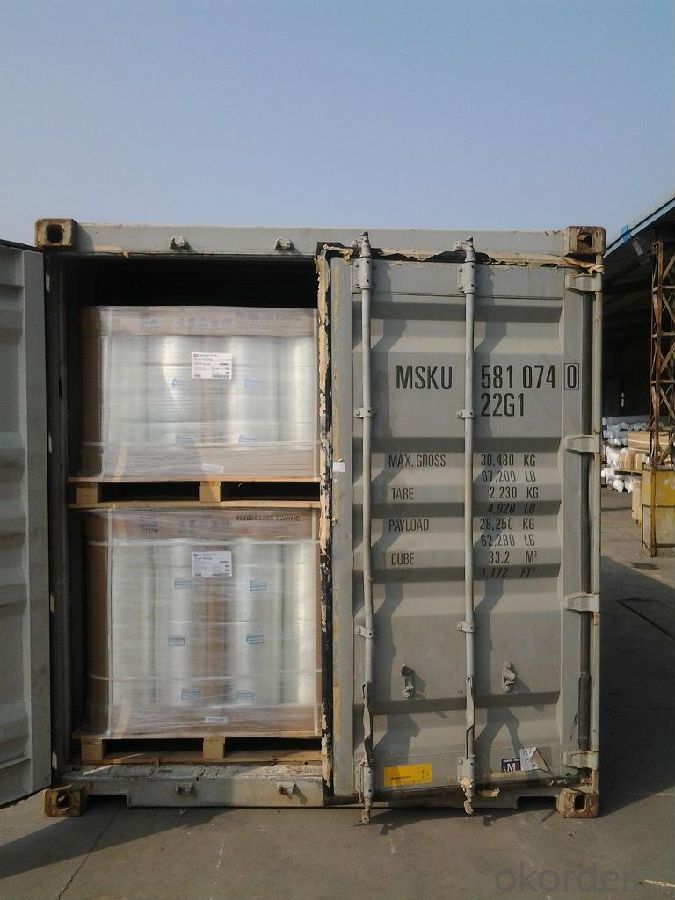
FAQ
Q: Can you accept sample order?
A: Yes, we accept samples with little and reasonable charge
Q:What is your delivery time?Can we short it in 7 days or less?
A: 3 days for sample, 3-25 days for mass production(depend quantity).
- Q:How is fiberglass chopped strand used in the telecommunications industry?
- Various applications in the telecommunications industry make extensive use of fiberglass chopped strand. The reinforcement of plastic components in communication cables stands out as one of the primary functions of fiberglass chopped strand in this industry. These cables serve the purpose of transmitting data, voice, and video signals over long distances. To create a composite material, a thermoplastic resin, such as polyethylene or polypropylene, is mixed with the fiberglass chopped strand. The resulting composite is then employed in the manufacturing of the outer protective layer or jacket of communication cables. The addition of fiberglass reinforcement enhances the strength and durability of the cables, enabling them to withstand harsh environmental conditions, including extreme temperatures, moisture, and UV radiation. Moreover, the production of fiber optic cables heavily relies on fiberglass chopped strand. These cables are essential for high-speed data transmission and internet connectivity. In fiber optic cables, chopped fiberglass strands are impregnated with a UV-resistant resin and wound around the glass fibers, providing mechanical protection. This reinforcement effectively safeguards the delicate glass fibers, ensuring the dependable and efficient transmission of data signals. Furthermore, the manufacturing of telecommunication equipment, such as antenna radomes, can also incorporate fiberglass chopped strand. Radomes function as protective covers that enclose antennas, guarding them against external elements. By embedding the chopped fiberglass strands in a resin matrix, a lightweight and durable material is created, which offers exceptional electromagnetic transparency. This transparency allows the antennas to transmit and receive signals without interference, thereby ensuring optimal performance. In conclusion, fiberglass chopped strand plays a vital role in the telecommunications industry by reinforcing communication cables, fiber optic cables, and telecommunication equipment. Its exceptional strength, durability, and resistance to environmental factors make it an ideal material for guaranteeing reliable and efficient communication networks.
- Q:Is fiberglass chopped strand suitable for automotive interior components?
- Yes, fiberglass chopped strand is suitable for automotive interior components. It is a versatile material that offers excellent strength, rigidity, and durability, making it ideal for various interior applications such as door panels, dashboard components, and seat structures. Additionally, fiberglass chopped strand can be easily molded into complex shapes and is resistant to chemicals, heat, and moisture, ensuring long-lasting performance in automotive environments.
- Q:Can fiberglass chopped strand be used in the production of medical implants?
- Fiberglass chopped strand is not typically used in the production of medical implants. Medical implants require materials that are biocompatible, meaning they do not cause any adverse reactions or harm to the human body. Fiberglass chopped strand is made of glass fibers that may not meet the biocompatibility requirements for medical implants. It is more commonly used in industries such as automotive, aerospace, and construction. In the medical field, implants are often made from materials like titanium, stainless steel, or biocompatible polymers that have been extensively tested and approved for use in the human body. These materials have specific properties that make them suitable for implantation, such as their resistance to corrosion, ability to integrate with surrounding tissues, and compatibility with medical imaging techniques. Therefore, it is advisable to use materials specifically designed and approved for medical implant applications to ensure patient safety and optimal performance.
- Q:Is fiberglass chopped strand water-resistant?
- Fiberglass chopped strand is indeed resistant to water. It possesses a special resin coating that aids in repelling water and preventing its absorption into the material. Due to this characteristic, fiberglass chopped strand is a favored option for applications that involve water exposure or require moisture resistance, like constructing boats, swimming pools, and bathroom fixtures. Nevertheless, it should be acknowledged that while fiberglass chopped strand is water-resistant, it is not entirely waterproof. Extended contact with water or immersion can still result in damage or deterioration over time. Therefore, it is crucial to exercise caution and employ additional waterproofing measures, such as sealants or coatings, as needed.
- Q:Can fiberglass chopped strand be recycled?
- Yes, fiberglass chopped strand can be recycled. Fiberglass is a highly recyclable material that can be melted down and reformed into new products. The recycling process involves breaking down the chopped strand into smaller pieces, separating it from any other materials or contaminants, and then melting it to create new fiberglass products. Recycling fiberglass helps to reduce waste and conserve resources, making it an environmentally-friendly option.
- Q:Is fiberglass chopped strand resistant to heat?
- Yes, fiberglass chopped strand is generally resistant to heat. Fiberglass is made from a combination of glass fibers and a thermosetting resin, usually polyester or epoxy. These materials have a high melting point and can withstand high temperatures without melting or deforming. However, it is important to note that the heat resistance of fiberglass can vary depending on the specific type and composition of the material. Some fiberglass products are designed to withstand higher temperatures than others. It is always recommended to check the manufacturer's specifications and guidelines for the specific fiberglass chopped strand product to determine its heat resistance capabilities.
- Q:How does the fiber surface treatment affect the properties of fiberglass chopped strand?
- The fiber surface treatment significantly affects the properties of fiberglass chopped strand. The treatment improves the bonding between the glass fibers and the resin matrix, enhancing the overall strength and durability of the composite material. It also reduces the likelihood of fiber breakage during processing, leading to improved mechanical properties such as tensile strength and impact resistance. Additionally, the surface treatment can enhance the adhesion between the chopped strand and other materials, allowing for better integration in various applications.
- Q:Can fiberglass chopped strand be used in the production of aerospace structures?
- Yes, fiberglass chopped strand can be used in the production of aerospace structures. It is commonly used as a reinforcement material in composite materials for various aerospace applications, including aircraft parts and components. The high strength-to-weight ratio and excellent mechanical properties of fiberglass make it suitable for enhancing the structural integrity and performance of aerospace structures.
- Q:How is fiberglass chopped strand used in the renewable energy sector?
- Fiberglass chopped strand is widely used in the renewable energy sector due to its excellent properties and versatility. It is primarily used in the manufacturing of wind turbine blades, which are a critical component of wind energy systems. The chopped strand is mixed with a resin matrix, usually epoxy or polyester, to form a composite material. This composite is lightweight, yet strong and durable, making it ideal for constructing wind turbine blades. The fiberglass reinforcement enhances the strength and stiffness of the blades, enabling them to withstand the high stresses and loads experienced during operation. Furthermore, fiberglass chopped strand offers excellent corrosion resistance, which is vital in offshore wind farms where turbines are exposed to harsh marine environments. It also possesses excellent electrical insulation properties, ensuring safe and efficient energy transmission. The use of fiberglass chopped strand in wind turbine blades also contributes to the sustainability of the renewable energy sector. Fiberglass is a non-toxic material and can be recycled, reducing the environmental impact of wind turbine blade disposal. Additionally, the lightweight nature of the composite material reduces the overall weight of the blades, enabling more efficient operation and increased energy production. In conclusion, fiberglass chopped strand plays a crucial role in the renewable energy sector by providing a strong, lightweight, and durable material for wind turbine blades. Its excellent properties and recyclability make it an ideal choice for constructing sustainable and efficient wind energy systems.
- Q:Can fiberglass chopped strand be used in corrosion-resistant applications?
- Fiberglass chopped strand is indeed suitable for applications that require resistance to corrosion. This material, known for its exceptional corrosion resistance properties, is highly advantageous for situations where protection against corrosion is necessary. The chopped strand variant of fiberglass can effectively reinforce a variety of products and structures, including pipes, tanks, and panels, thereby enhancing their resistance to corrosion. By incorporating fiberglass chopped strand into these applications, the material serves to prevent the occurrence of rust and degradation caused by corrosive environments, ensuring the long-lasting and durable nature of the products. Moreover, fiberglass chopped strand offers additional benefits such as high strength, lightweight nature, and ease of processing, making it an adaptable choice for corrosion-resistant applications.
1. Manufacturer Overview |
|
|---|---|
| Location | |
| Year Established | |
| Annual Output Value | |
| Main Markets | |
| Company Certifications | |
2. Manufacturer Certificates |
|
|---|---|
| a) Certification Name | |
| Range | |
| Reference | |
| Validity Period | |
3. Manufacturer Capability |
|
|---|---|
| a)Trade Capacity | |
| Nearest Port | |
| Export Percentage | |
| No.of Employees in Trade Department | |
| Language Spoken: | |
| b)Factory Information | |
| Factory Size: | |
| No. of Production Lines | |
| Contract Manufacturing | |
| Product Price Range | |
Send your message to us
High Silica Chopped Strands
- Loading Port:
- China Main Port
- Payment Terms:
- TT or LC
- Min Order Qty:
- 4000 kg
- Supply Capability:
- 5000000 kg/month
OKorder Service Pledge
OKorder Financial Service
Similar products
New products
Hot products
Related keywords
